The iPhone 11's Most Controversial New Feature Might Also Come To The iPad
It's a bit bizarre that there's already so much controversy surrounding an iPhone that's going to look almost exactly like its predecessors. In fact, if you hold an iPhone XS and an iPhone 11 next to each other next month following the 2019 model's release, the to phones will be completely indistinguishable from the front. While Android phone makers around the world have come up with a wide range of exciting new all-screen designs for their smartphones, Apple is stuck in the past this year. It might seem odd to call a design introduced in 2017 "the past," but that's how quickly things are moving right now in the smartphone business. Every vendor is in a race to achieve a true all-screen design, where 100% of a smartphone's front side is occupied by the display. While some Android phone makers have now managed to achieve screen-to-body ratios that climb into the mid-90% range, Apple is still stuck in the low-80% range because of the huge notch at the top of the iPhone's display. Apple is working toward releasing all-screen smartphones just like all of its rivals, but in 2019 it will use the exact same screen design for the third consecutive year.
The decision to reuse the same iPhone design yet again in 2019 might be disappointing to some Apple fans out there, but it wasn't such a deal back in 2016 when Apple released the iPhone 7 series. That phone looked exactly like the iPhone 6 and iPhone 6s, and yet it led to the biggest quarter of iPhone sales that Apple has ever recorded. And just like the iPhone 7 Plus, Apple's new iPhone 11 series smartphones will introduce one key hardware change that already has people talking. Now, it turns out that this big change might be coming to Apple's iPad lineup as well later this year.
By now you have no doubt surmised that we're talking about the new rear camera on Apple's iPhone 11, iPhone 11 Pro, and iPhone 11R — or whatever Apple ends up calling its new iPhone lineup. You can see it in the image above, but here's a closer look at the new design:

These are renders based on all the leaks we've seen and read about so far, but we've heard enough info from reliable sources to be extremely confident that this is indeed what Apple's new iPhone 11 and iPhone 11 Pro will look like. And here's the design we're expecting to see on the iPhone 11R:

It's quite similar, but there are only two lenses on the back of the iPhone 11R as opposed to three on the iPhone 11 and iPhone 11 Pro.
People haven't even gotten their hands on these new iPhones yet, and there are already tons of complaints about the new design all over social media. That's right, it's the notch all over again — and the complaints are just as stupid as they were back in 2017 before Apple introduced the notch on the iPhone X. We already explained why people need to stop whining about this controversial new iPhone 11 camera design, but it boils down to this: it looks weird now, but it'll be completely normal within a few weeks of the iPhone 11's release. There will be millions of these phones all over the world, and people will get used to the new look very quickly. It's the same old story.
Even if you don't plan to buy a new iPhone 11 model this year, you should definitely get past any negative feelings you have about these new cameras because it seems like they're here to stay. What makes us say that? Well it turns out it might not just be Apple's new iPhones that get the square camera bump. According to the Japanese-language Apple news blog Macotakara, Apple's upcoming new iPad lineup will feature the same camera design.

The renders above supposedly show Apple's upcoming new iPad Pro and 7th-generation iPad tablets that are set to debut later this year, likely in October. The iPad Pro, pictured on the left, will apparently have the same triple-lens camera as the iPhone 11 and iPhone 11 Pro. Meanwhile, the 7th-generation iPad on the right will reportedly get the iPhone 11R's dual-lens camera.
None of this is confirmed for the time being, but it would be quite impressive to see Apple include the same cutting-edge cameras from its new iPhone 11 series on the iPad Pro and the entry-level iPad.
